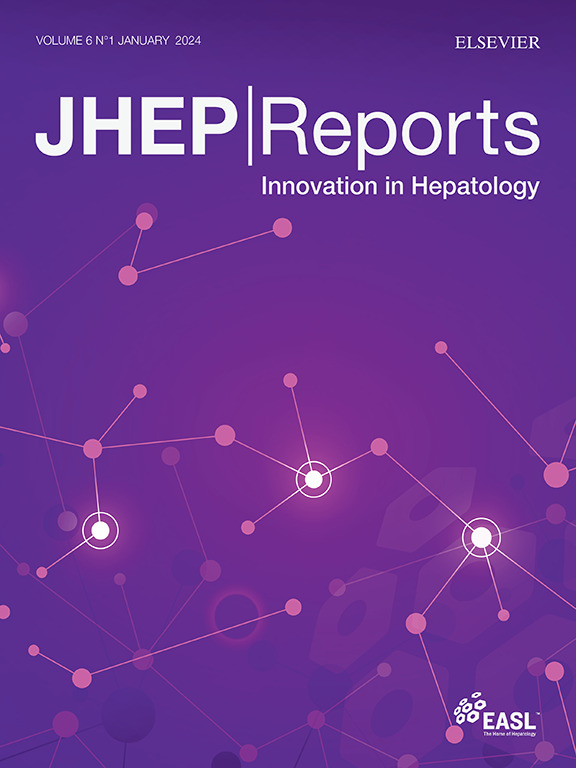Sex differences in murine MASH induced by a fructose-palmitate-cholesterol-enriched diet
IF 9.5
1区 医学
Q1 GASTROENTEROLOGY & HEPATOLOGY
引用次数: 0
Abstract
Background & Aims
Metabolic syndrome-associated steatotic liver disease (MASLD) and metabolic syndrome-associated steatohepatitis (MASH) have global prevalence rates exceeding 25% and 3-6%, respectively. The introduction of high-fructose corn syrup to the diet in the 1970s has been linked to metabolic and hepatic disturbances. Despite these associations, the potential for sex-dependent responses resulting from fructose-containing diets on MASLD/MASH has not been addressed.
Methods
Female and male C57BL/6J mice were fed a fructose-palmitate-cholesterol (FPC)-NASH diet vs. standard chow for 16 weeks (n = 40 mice). At sacrifice, plasma and liver were retrieved, the latter for single-nucleus RNA sequencing. Publicly available data sets of human male and female MASH liver were probed.
Results
The FPC-NASH diet-induced metabolic dysfunction in both female and male mice, with females exhibiting more severe hepatic steatosis (p = 0.0262), inflammation (p = 0.0206), and fibrosis (p <0.0001). Single-nucleus RNA sequencing revealed distinct sex-specific transcriptional profiles in hepatocytes and stellate cells responding to the FPC-NASH diet compared to the standard chow. In female mice, compared to males, pathways associated with lipid and metabolic processes in hepatocytes and cell-cell communication and adhesion in stellate cells were enriched. Metabolic flux analyses demonstrated reduced bile acid metabolism in female mice and human hepatocytes in FPC-NASH and MASH conditions, respectively, compared to their male counterparts.
Conclusions
Molecular profiling of hepatocytes and stellate cells in FPC-NASH diet-fed mice revealed significant sex differences mirrored in human MASH. The identification of intrinsic, within-sex, diet-dependent disparities underscores the critical need to include both male and female individuals in MAFLD/MASH studies and clinical trials.
Impact and implications:
Despite the importance of metabolic dysfunction-associated steatohepatitis (MASH) in impairment of human health, the potential for and mechanisms of sex-dependent responses have yet to be well-studied, particularly with respect to the possible influence of high-fructose corn syrup additives to the diet, which has been linked to metabolic and hepatic disturbances. In a mouse model of fructose supplementation to a NASH diet, female mice displayed significantly higher MASH scores (steatosis, inflammation and fibrosis) compared to male mice. Single-nucleus RNA sequencing of livers revealed intrinsic, diet-dependent molecular disparities within sex, which were exaggerated when comparing female vs. male mice fed the fructose-containing NASH diet; many of these findings were recapitulated in human female vs. male patients with MASH. These results highlight potential mechanistic explanations and therapeutic targets for addressing sex differences and underscore the need to study both sexes in animal models and human MASH.

富含果糖-棕榈酸-胆固醇的饮食诱导小鼠MASH的性别差异
背景,代谢综合征相关脂肪性肝病(MASLD)和代谢综合征相关脂肪性肝炎(MASH)的全球患病率分别超过25%和3-6%。20世纪70年代,高果糖玉米糖浆被引入饮食中,与代谢和肝脏紊乱有关。尽管存在这些关联,但含有果糖的饮食对MASLD/MASH产生性别依赖性反应的可能性尚未得到解决。方法将雌性和雄性C57BL/6J小鼠分别饲喂果糖-棕榈酸-胆固醇(FPC)-NASH饮食(对照标准饲料)16周(n = 40只)。献祭时取血浆和肝脏,后者用于单核RNA测序。研究了人类男性和女性MASH肝脏的公开数据集。结果FPC-NASH饮食诱导的雌性和雄性小鼠代谢功能障碍,雌性小鼠表现出更严重的肝脏脂肪变性(p = 0.0262)、炎症(p = 0.0206)和纤维化(p <0.0001)。单核RNA测序显示,与标准食物相比,肝细胞和星状细胞对FPC-NASH饮食有明显的性别特异性转录谱。在雌性小鼠中,与雄性小鼠相比,与肝细胞中的脂质和代谢过程以及星状细胞中的细胞间通讯和粘附相关的途径更加丰富。代谢通量分析表明,与雄性小鼠相比,FPC-NASH和MASH条件下雌性小鼠和人类肝细胞的胆汁酸代谢分别减少。结论FPC-NASH饮食喂养小鼠的肝细胞和星状细胞的分子谱显示了人类MASH中显著的性别差异。对内在的、性别内的、饮食依赖性差异的识别强调了在MAFLD/MASH研究和临床试验中同时纳入男性和女性个体的迫切需要。影响和影响:尽管代谢功能障碍相关脂肪性肝炎(MASH)在损害人类健康方面具有重要意义,但性别依赖性反应的潜力和机制尚未得到充分研究,特别是关于饮食中高果糖玉米糖浆添加剂的可能影响,这与代谢和肝脏紊乱有关。在NASH饮食中添加果糖的小鼠模型中,与雄性小鼠相比,雌性小鼠的MASH评分(脂肪变性、炎症和纤维化)明显更高。肝脏的单核RNA测序揭示了内在的、饮食依赖的性别分子差异,在喂食含有果糖的NASH饮食的雌性和雄性小鼠的比较中,这种差异被夸大了;许多这些发现在人类女性与男性MASH患者中得到了概括。这些结果强调了解决性别差异的潜在机制解释和治疗目标,并强调了在动物模型和人类MASH中研究两性的必要性。
本文章由计算机程序翻译,如有差异,请以英文原文为准。
求助全文
约1分钟内获得全文
求助全文
来源期刊

JHEP Reports
GASTROENTEROLOGY & HEPATOLOGY-
CiteScore
12.40
自引率
2.40%
发文量
161
审稿时长
36 days
期刊介绍:
JHEP Reports is an open access journal that is affiliated with the European Association for the Study of the Liver (EASL). It serves as a companion journal to the highly respected Journal of Hepatology.
The primary objective of JHEP Reports is to publish original papers and reviews that contribute to the advancement of knowledge in the field of liver diseases. The journal covers a wide range of topics, including basic, translational, and clinical research. It also focuses on global issues in hepatology, with particular emphasis on areas such as clinical trials, novel diagnostics, precision medicine and therapeutics, cancer research, cellular and molecular studies, artificial intelligence, microbiome research, epidemiology, and cutting-edge technologies.
In summary, JHEP Reports is dedicated to promoting scientific discoveries and innovations in liver diseases through the publication of high-quality research papers and reviews covering various aspects of hepatology.
 求助内容:
求助内容: 应助结果提醒方式:
应助结果提醒方式:


